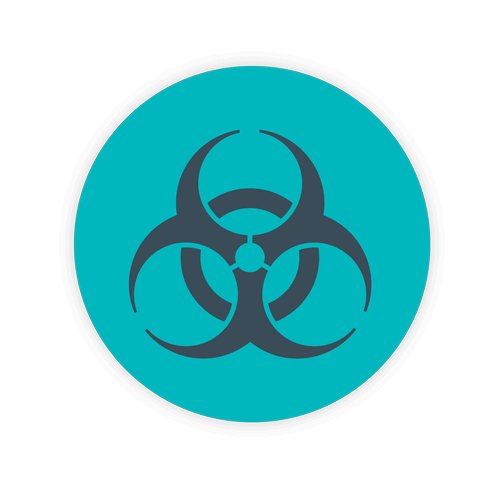Your Guide to Florida Medical Waste Regulations

You can probably name a handful of Florida beaches, but can you name some common medical waste reguations for the sunshine state? Not the most exciting topic to read or write about, but you know what could happen if you’re found noncompliant with Florida’s medical waste regulations? A lot of financial headache and a loss of reputation or career is just the tip of the repercussional iceberg.
You need to know about all types of healthcare wastes if you’re in the Florida healthcare indudstry. That means biohazard waste, chemical waste, chemotherapy waste, pathological waste, and others! Did you know that based on federal regulations (Resource Conservation and Recovery Act – RCRA), storing, treating, or disposing of medical waste without a permit can cost you $50,000 per day for a single violation? Did you know that endangering the public in any way through the treatment, transportation, storage, or disposal of hazardous waste can cost you $250,000 and up to $1 million if you’re an organization? That doesn’t even include possible jail time.
If that doesn’t get your attention, nothing will. That’s why Daniels Health focuses on the details. It’s so important to understand Florida’s medical waste regulations. Who can afford those fines? Who can afford the fallout with noncompliance in regard to reputation, potential business, and the stability of your facility, whether you’re a university hospital, an outpatient center, or a private practice?
Know the regulations. They’re in print. No excuses, let’s go.
Basics to Florida’s medical waste regulations
How does the Sunshine state rate with its medical waste regulations? Quite impressive, really. Most of the governing laws and regulations regarding Florida’s guidelines for medical waste management are found within Florida’s Administrative Code (FAC) 64E-16.001through 16.013.
A brief glance at the sections within these laws make specific regulations easier to find. Dry reading, yes, but still more enjoyable than paying fines for noncompliance. Here is a brief overview of the sections found regarding medical waste management: 
- Definitions 16.002
- Storage 16.004
- Packaging 16.004
- Labeling 16.005
- Treatment 16.007(1) through 16.007(4)
- Disposal 16.007(7)
- Permits 16.001 and 16.012
Taking the time to read through governing regulations aids any size facility or waste generator to maintain and observe compliance regulations. Medical waste generators – whether you’re a veterinary practice, a dental office, and outpatient treatment center, a dialysis clinic, or a hospital – take the ultimate responsibility for proper medical waste disposal, and in regard to what type of waste stream is generated. It’s also the generator’s responsibility to ensure that any medical sharps disposal companies, any medical waste pickup companies, or sharps removal service are following state and federal guidelines.
The buck stops with you.
Florida makes it a little easier on facilities by supplying not only state requirements in regard to solid waste, hazmat transportation or hazardous waste determination, but also provides checklists, forms, handouts, and plans for:
- Medical waste management plan checklist (DHS form #8661)
- Infectious materials transportation
- A sample of a certificate for treated infectious waste
Take the time to research these documents and understand hazardous and non-hazardous waste regulations.
What about Florida’s biohazard waste regulations?
Different medical waste stream categories require different segregation, storage, and transportation approaches. Do you know Florida’s definition of biohazardous waste? Is the waste produced in your facility considered “regular” or biohazard waste?
You’ll find the definition under chapter 64E-16 of the Florida Administrative Code. Biomedical waste is defined as “any solid or liquid waste which may present a threat of infection to humans, non-liquid tissue, body parts, blood, blood products, and body fluids from humans and other primates; laboratory and veterinary wastes which contain human disease-causing agents; and discarded sharps…” There’s more, but that provides a basic gist of the definition.
Did you know that in Florida, you can’t store biomedical waste from a generating facility for more than 30 days? (64E-16.004) That 30 day period starts the moment a non-sharp biomedical waste item is tossed into a sharps container or a red bag, or when a sharps container is sealed.
What do Florida’s guidelines for medical waste regulations have to say about sharps?
Sharps injury reduction and reduction of needlestick injuries are the goal when it comes to sharps container placement, sharps removal service options, and of course, employee safety. Are you compliant with Florida’s sharps container placement?
Found under 64E-16.004, the state of Florida mandates that a permanently mounted sharps container holder must be clearly labeled with the phrase and the international biological hazards symbol described in paragraph 64E-16.004(2)(a), F.A.C., if this information on the sharps container is concealed by the sharps container holder.
It doesn’t end there. Biological hazards symbols must be at least 6 inches in diameter on outer containers that are 19” x 14” or larger, and at least 1 inch in diameter on outer containers that are less than 19” x 14”.
The above paragraph is an example of why it’s so important to read the fine print.
The stipulations regarding proper labeling, containment, collection, storage, or transportation of medical waste is serious business. That’s why it’s also important to be knowledgeable about proper waste segregation. Putting the wrong types of waste together can cost big bucks. Daniels Health is familiar with waste segregation, waste stream determination, and waste audit procedures. We take the guesswork out of federal and state regulations.
Other federal and state agencies are involved in biohazard waste regulations from Florida, such as the Occupational Safety and Health Administration (OSHA). Primarily, OSHA is focused on the Occupational Exposure to Blood-Borne Pathogens Standard which influence the handling of medical or infectious waste including sharps management as well as specific requirements for sharps container placement and usage, as well as employee training.
It’s best not to ignore any regulations. Within the past year, OSHA fined a podiatry clinic in Missouri just over $93,000 for potentially exposing employees of that clinic to infectious materials, which violated the hazard communication standards.
Don’t underestimate biomedical waste concerns
It is estimated that just over 40,000 facilities in the state of Florida generate biomedical waste, including but not limited to:
- hospitals
- nursing homes
- clinics
- dentists
- funeral homes
- laboratories
- tattoo/body piercing shops
Florida’s Department of Environmental Protection offers a number of resources to aid facilities with medical waste segregation, labeling, and operating plans. When it comes to medical waste management and biomedical waste disposal, it would behoove any medical waste generator in the state of Florida to become familiar with the state’s Biomedical Waste Operating Plan. The plan offers specific information regarding:
- segregation
- containment/storage
- proper labeling
- transport
- procedures for decontaminating biomedical waste spills
- contingency plan
The state of Florida is very specific about its medical waste including red bags. Red bags must meet or exceed the requirements of the state of Florida’s Administrative Code (Chapter 64E-16). They also have specific guidelines for needle collection programs as well as home management of sharps.
Take the guesswork out of healthcare waste management and disposal. Daniels Health has the experience, the knowledge, and most importantly, the time to dig deep into specific regulations of both federal and state levels to ensure compliance and reduce risk of fines and/or penalties. For information about how we can help you when it comes to your medical waste, give us a call today.
If you would like further help navigating Florida’s medical waste regulations, call one of our clinical experts today! Alternatively find out more about our Florida operations and service capabilities on our Florida service page here.
Let's Talk!
Your time is valuable, and we don’t want to play hard to get. You can either phone us directly on the details listed on our contact page, or feel free to fill out this short form and one of our team members will get back to you as quickly as possible.
